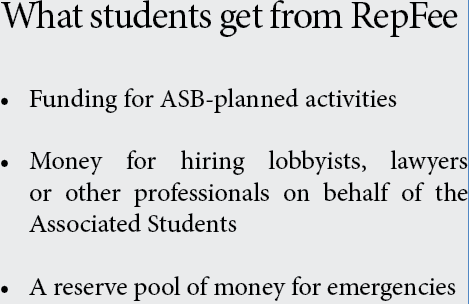The SRJC Associated Student Senate contacted a legal team for an opinion on the legality of using funds from the Student Representation Fee to pay administrative assistants.
The administrative assistant that supports the ASB receives $35,000 annually from the Student Representation fund. The fund is benefitting from a surplus from the last fiscal year, but the fund’s other purpose is to provide money for student-planned events.
ASB President Jessica Jones and Executive Vice President Robert Edmonds led the first student senate to question the use of the restricted Student Representation fund. “It wasn’t made clear by my predecessor that I had purview, and I don’t think he knew he had purview either,” Jones said. “There is no legal opinion on using RepFee for community colleges but there is one for CSUs and UCs.”
If the legal team’s opinion excludes paying salaries, other community colleges that also use the fund for administrative assistants will have to change their policies as well. With more money reserved for student activities and events, the ASB will have more funding to budget events that benefit SRJC both academically and culturally.
A memorandum the chancellor’s office released over 15 years ago allows for a small percentage of the administrative assistant’s salary to be supplemented by the fund, but currently almost half of the salary is provided by RepFee money.
Edmonds was dissatisfied with the current interpretation of the fund, and promptly motioned for a legal opinion. After the legal team offers its opinion, it will go through the district, which includes SRJC President Dr. Frank Chong, Vice President of Student Services Ricardo Navarrette, Vice President of Business Doug Roberts and Director of Student Programs and New Student Activities Robert Ethington for verification. The chancellor’s office will review the opinion from the district, and release a memorandum with the new interpretation of the Student Representation fund’s use.
The current interpretation for the use of the Student Representation fund allows for the salary of the administrative assistant to the ASB to partially come from the Student Representation Fund. The administrative assistant’s duty to the ASB includes organizing senate minutes and noting the minutes at all senate meetings. Forty-five percent of the assistant’s salary is subsidized by the Student Representation fund.
The Student Representation Fee is the optional $1 charge every student can choose to pay that becomes reserved for any activity or charge related to student activities. However, the process to use the funds for budget purposes is closely regulated by the Board of Trustees. Typically, the budget needs to be drafted with the fund’s projected usage included; Ethington introduces the budget to the board. Currently, the process of getting representation fee money is very tight, and adds a layer of difficulty when the ASB tries to use it for events it didn’t budget for.
“My interpretation of the RepFee is it has to have one or two degrees of separation from legislation,” Edmonds said. He said he would like the fund to be easier to access, used primarily for student activities. “The fund is linked to enrollment, and enrollment has been going down.”
Jones and Edmonds are working with student ambassadors and other ASB officials to find any kind of legal interpretation that clarifies the use of this fund. Both are hoping the legal team’s opinion clears up any legal about the fund. If the interpretation excludes supplementing the salary, SRJC will have to find another way to pay the assistant in full.
“A lot of salaries get paid out of categorical funding,” Edmonds said. “Funding streams dry up, different ones are found.”
Rich Copenhagen, president of the Statewide Student Senate, fully supports Jones and Edmonds. The Statewide Student Senate bridges California’s community colleges and is comprised of three senators from each of its 10 regions. The senate works with the chancellor’s office “to serve as the voice of the students in matters of statewide concern and before the Board of Governors, Consultation Council and all statewide boards, committees and ad hoc groups,” according to the Student Senate for California Community Colleges’ website.
After submitting the query to the legal team, Jones and Edmonds expect an interpretation within two weeks. Edmonds said if the student representation fund becomes dedicated to student programs and needs, leaders can budget for much bigger programs in the future.


